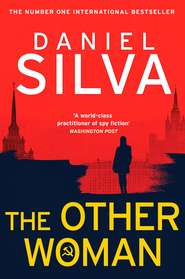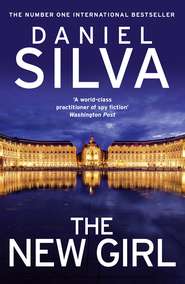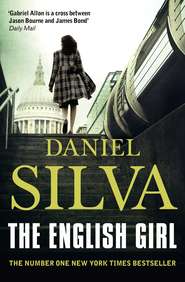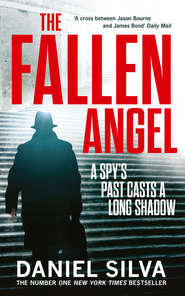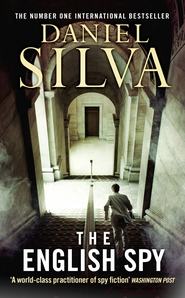По всем вопросам обращайтесь на: info@litportal.ru
(©) 2003-2024.
✖
The Heist
Настройки чтения
Размер шрифта
Высота строк
Поля
He dialed the number again now, but this time it rang unanswered. Then, reluctantly, he forwarded it securely to the Operations Desk at King Saul Boulevard and asked for a routine check. Ten minutes later came the reply: 6215845 was an unpublished number located in the rectory of the Church of San Giovanni Evangelista in Brienno, which was located a few kilometers up the lakeshore.
Gabriel picked up the slip of paper that had been at the top of Jack Bradshaw’s telephone message pad on the night of his murder. Tilting it toward the lamp, he studied the indentations that had been left by Bradshaw’s fountain pen. Then he removed a pencil from the top drawer of the desk and rubbed the tip gently across the surface until a pattern of lines emerged. Most of it was an impenetrable mess: the numeral 4, the numeral 8, the letters C and V and O. At the bottom of the page, however, a single word was clearly visible.
Samir …
8 (#ulink_712e2883-fee3-5943-9406-d09ebab30b86)
STOCKWELL, LONDON (#ulink_712e2883-fee3-5943-9406-d09ebab30b86)
THE ROAD WAS CALLED PARADISE, but it was a paradise lost: tattered blocks of redbrick council flats, a patch of trampled grass, a childless playground where a merry-go-round rotated slowly in the wind. Gabriel lingered there only long enough to make sure he was not being followed. He pulled his coat collar around his ears and shivered. Spring had not yet arrived in London.
Beyond the playground a dirty passageway led to Clapham Road. Gabriel turned to the left and walked through the glare of the oncoming traffic to the Stockwell Tube station. Another turn brought him to a quiet street with a terrace of sooty postwar houses. Number 8 had a crooked black fence of wrought iron and a tiny cement garden with no decoration other than a royal blue recycling bin. Gabriel lifted the lid, saw the bin was empty, and climbed the three steps to the front door. A sign stated that solicitations of any kind were unwelcome. Ignoring it, he placed his thumb atop the bell push—two short bursts, a longer third, just as he had been told. “Mr. Baker,” said the man who appeared in the doorway. “So good of you to come. I’m Davies. I’m here to look after you.”
Gabriel entered the house and waited for the door to close before turning to face the man who had admitted him. He had soft pale hair and the guiltless face of a country parson. His name was not Davies. It was Nigel Whitcombe.
“Why all the cloak-and-dagger stuff?” asked Gabriel. “I’m not defecting. I just need a word with the boss.”
“The Intelligence Service frowns on the use of real names in safe houses. Davies is my work name.”
“Catchy,” said Gabriel.
“I chose it myself. I was always fond of the Kinks.”
“Who’s Baker?”
“You’re Baker,” replied Whitcombe without a trace of irony in his voice.
Gabriel entered the small sitting room. It was furnished with all the charm of an airport departure lounge.
“You couldn’t find a safe house in Mayfair or Chelsea?”
“All the West End properties were taken. Besides, this one’s closer to Vauxhall Cross.”
Vauxhall Cross was the headquarters of Britain’s Secret Intelligence Service, also known as MI6. There was a time when the service operated from a dingy building in Broadway and its director-general was known only as “C.” Now the spies worked in one of London’s flashiest landmarks, and their boss’s name appeared regularly in the press. Gabriel liked the old ways better. In matters of intelligence, as in art, he was a traditionalist by nature.
“Does the Intelligence Service allow coffee in safe houses these days?” he asked.
“Not real coffee,” replied Whitcombe, smiling. “But there might be a jar of Nescafé in the pantry.”
Gabriel shrugged, as if to say one could certainly do worse than Nescafé, and followed Whitcombe into the galley kitchen. It looked as though it belonged to a man who was recently separated and hoping for a quick reconciliation. There was indeed a container of Nescafé, along with a tin of Twinings that looked as though it had been there when Edward Heath was prime minister. Whitcombe filled the electric kettle with water while Gabriel searched the cabinets for a mug. There were two, one with the logo of the London Olympic Games, the other with the face of the Queen. When Gabriel chose the mug with the Queen, Whitcombe smiled.
“I never realized you were an admirer of Her Majesty.”
“She has good taste in art.”
“She can afford to.”
Whitcombe offered this assessment not as a criticism but merely an observation of fact. He was like that: careful, shrewd, opaque as a concrete wall. He had started his career at MI5, where he had cut his operational teeth working with Gabriel against a Russian oligarch and arms dealer named Ivan Kharkov. Soon after, he became the primary aide-de-camp and runner of off-the-record errands for Graham Seymour, MI5’s deputy director-general. Seymour had recently been named the new chief of MI6, a move that surprised everyone in the intelligence trade except Gabriel. Whitcombe was now serving his master in the same capacity, which explained his presence in the Stockwell safe house. He spooned the Nescafé into the mug and watched the steam rising from the spout of the kettle.
“How’s life at Six?” asked Gabriel.
“When we first arrived, there was a great deal of suspicion among the troops. I suppose they had a right to be uneasy. After all, we were coming across the river from a rival service.”
“It’s not as if Graham was a total outsider. His father was an MI6 legend. He was practically raised within the service.”
“Which is one of the reasons any concerns were short-lived.” Whitcombe drew a mobile device from the breast pocket of his suit and peered at the screen. “He’s pulling up now. Can you manage the coffee on your own?”
“Pour in the water, then stir, right?”
Whitcombe departed. Gabriel prepared the coffee and went into the sitting room. Entering, he saw a tall figure clad in a perfectly fitted charcoal-gray suit and a striped blue necktie. His face was fine boned and even featured; his hair had a rich silvery cast that made him look like a male model one might see in ads for costly but needless trinkets. He was holding a mobile phone to his ear with his left hand. The right he stretched absently toward Gabriel. His handshake was firm, confident, and appropriate in duration. It was an unfair weapon to be deployed against inferior opponents. It said he had attended the better schools, belonged to the better clubs, and was good at gentlemanly games like tennis and golf, all of which happened to be true. Graham Seymour was a relic of Britain’s glorious past, a child of the administrative classes who had been bred, educated, and programmed to lead. A few months earlier, weary after years of trying to protect the British homeland from the forces of Islamic extremism, he had privately told Gabriel of his plans to leave the intelligence trade and retire to his villa in Portugal. Now, unexpectedly, he had been handed the keys to his father’s old service. Gabriel suddenly felt guilty about coming to London. He was about to hand Seymour his first potential crisis at MI6.
Seymour murmured a few words into the mobile phone, severed the connection, and handed it to Nigel Whitcombe. Then he turned toward Gabriel and regarded him curiously for a moment. “Given our long history together,” Seymour said finally, “I’m a bit reluctant to ask what brings you to town. But I suppose I have no choice.”
Gabriel responded by telling Seymour a small portion of the truth—that he had come to London because he was looking into the murder of an expatriate Englishman living in Italy.
“Does the expatriate Englishman have a name?” asked Seymour.
“James Bradshaw,” replied Gabriel. He paused, then added, “But his friends called him Jack.”
Seymour’s face remained a blank mask. “I think I read something about that in the papers,” he said. “He was former Foreign Office, wasn’t he? Did some consulting work in the Middle East. He was murdered at his villa in Como. Apparently, it was quite messy.”
“Quite,” agreed Gabriel.
“What does any of this have to do with me?”
“Jack Bradshaw wasn’t a diplomat, was he, Graham? He was MI6. He was a spy.”
Seymour managed to maintain his composure for a moment longer. Then he narrowed his eyes and asked, “What else have you got?”
“Three stolen paintings, a vault in the Geneva Freeport, and someone named Samir.”
“Is that all?” Seymour shook his head slowly and turned to Whitcombe. “Cancel my appointments for the remainder of the afternoon, Nigel. And find us something to drink. We’re going to be a while.”
9 (#ulink_4b056133-b768-546e-bba5-8b1e4e513941)
STOCKWELL, LONDON (#ulink_4b056133-b768-546e-bba5-8b1e4e513941)
WHITCOMBE WENT OUT TO FETCH the makings of a gin and tonic while Gabriel and Graham Seymour settled into the charmless little sitting room. Gabriel wondered what sort of intelligence debris had floated through this place before him. A KGB defector willing to sell his soul for thirty pieces of Western silver? An Iraqi nuclear scientist with a briefcase full of lies? A jihadist double agent claiming to know the time and place of the next al-Qaeda spectacular? He looked at the wall above the electric fire and saw two horsemen in red jackets leading their mounts across a green English meadow. Then he glanced out the window and saw a portly lawn cherub keeping a lonely vigil in the darkening garden. Graham Seymour seemed oblivious to his surroundings. He was contemplating his hands, as if trying to decide where to begin his account. He didn’t bother to delineate the ground rules, for no such disclaimer was necessary. Gabriel and Seymour were as close as two spies from opposing services could be, which meant they distrusted each other only a little.
“Do the Italians know you’re here?” asked Seymour at last.
Gabriel shook his head.
“What about the Office?”
“I didn’t tell them I was coming, but that doesn’t mean they aren’t watching my every move.”
“I appreciate your honesty.”






